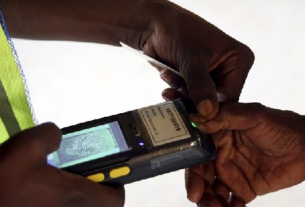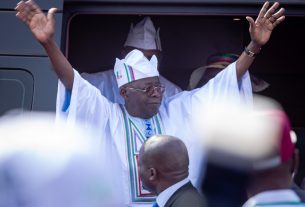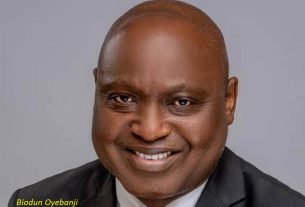Chairman of the Independent National Electoral Commission (INEC), Prof Mahmood Yakubu, has said despite the violence in various parts of the country, the general election will proceed as planned.
Yakubu, who said this while delivering a speech at Chatham House in London yesterday, assured there is no plan to postpone the election.
He said INEC was working with security agencies and other stakeholders to establish mechanisms to understand, track and mitigate the security challenges.
Yakubu said: “We are working collaboratively in the context of ICCES, and we also have the Election Violence Mitigation and Advocacy Tool (EVMAT), which is a research and diagnostic tool for predicting and mitigating election violence, prior to elections.
“In addition, there is the Election Risk Management Tool (ERM), which tracks and reports general risks to elections.
“In all, we feel assured by the actions we have taken and our collaboration with the security agencies. The 2023 general election will proceed as planned. There is no plan to postpone the election.”
Yakubu, however, said violence and threats of violence in parts of the country are challenges to credible elections.
The insecurity experienced in various parts of the country was making it difficult to deploy election materials to those areas.
He said this was particularly in areas where the attacks were targeted at the electoral process and participants.
Yakubu said the nation has experienced many years of insecurity, which began in the Northeast where there have been Boko Haram attacks.
He said this had escalated to other parts of the country.
Yakubu added: “In the Northwest and the Northcentral, banditry, terrorism and the herder-farmer conflicts remain major challenges. In the Southsouth, the threat of renewed insurgency by groups demanding more share of petroleum revenue to the Niger Delta continues to simmer.
“In the Southwest, although an earlier surge by a group demanding independence for the region has considerably dissipated, recent violent attacks on places of worship, rise in the activities of violent cults and kidnapping groups, as well as a history of violence involving groups seeking to control markets and motor parks, remain strong.
“In the Southeast, the lingering agitation for separatism championed by the Indigenous People of Biafra (IPOB) pose a major security threat. Not only have violent attacks by a number of armed groups increased, the long-standing weekly lockdown of the five states in that geo-political zone, continue to disrupt social and economic activities.”
The INEC chairman also said the fate of internally displaced voters is posing a threat to the conduct of the election.
He said in some states, the commission has found it difficult to identify the internally displaced persons (IDPs) because “they are not in camps but rather settled among extended family members, relations and good Samaritans within safer communities where they are not registered voters.”
He said consequently, it is difficult for the commission to provide necessary electoral services to them.
Yakubu disclosed that in 2015, an estimated two million voters were displaced by conflict in the Northeast and Northcentral.
He added that in response, INEC worked with the National Assembly to amend the Electoral Act to support voting by internally displaced persons.
Yakubu added: “This entailed making additional provisions for enumeration of IDP voters and for voting in their camps.”
The INEC chairman said the commission recently revised its policy on IDP voting, which it has been using since 2015, to cater for new realities of displaced populations.
He however assured that the IDP in camps within Nigeria would be catered for in line with INEC’s policy.
Yakubu likened the conduct of election in Nigeria to conducting elections in the whole of West Africa and beyond.
He pointed out that Nigeria’s current voter population is 16,742,916 higher than the 76,726,092 registered voters in the other 14 countries put together.
He stressed: “Given the geographical expanse of the country, the number of registered voters, electoral constituencies and polling units, conducting a general election in Nigeria is a huge undertaking.
“The delimitation details are staggering: 93,469,008 registered voters expected to elect their representatives for 1,491 constituencies in 176,846 polling units.
“Since 1999, Nigeria has been conducting regular general elections following the restoration of civilian-democratic rule governance after many years of military rule.
“The 2023 general election will be the seventh consecutive general election in Nigeria. This fact makes this the longest period of electoral democracy in the country’s history.
“Previous periods of electoral democracy were relatively short, repeatedly truncated by military interventions.”
The Nation





